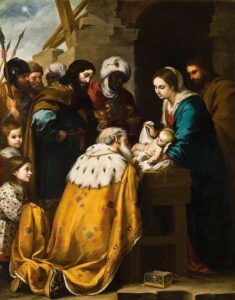
Who Were the [Two] Magi?
Weren’t there three magi? Also, weren’t they wise men and kings? One of their names was Casper, right? We actually have a lot of questions about the magi mentioned in Matthew 2. Matthew provides us with very little detail on them. Why should he? Matthew wants our attention to be on the same One who has drawn their attention. So let’s keep our hearts turned towards “the One who has been born king of the Jews,” while we briefly consider three things we know for sure about the magi, three things we can read from non-Biblical tradition, and three things that are merely interesting speculations.
Three Things We Know For Sure
•There were at least two magi because they are described in the plural. The number three snuck in because of three of the gifts specifically mentioned- gold, frankincense, and myrrh.
•The definition of magi in the Bible and other ancient texts is “wise men and priests, who were experts in astrology, interpretation of dreams, and various other occult arts (BDAG).” Daniel, Hananiah, Mishael, and Azariah (aka Shadrach, Meshach, and Abednego) were placed among the magi in Babylon. Daniel 1:20 says, “And in every matter of wisdom and understanding about which the king inquired of them, he found them ten times better than all the magicians and enchanters that were in all his kingdom.”
•They understood that “the One who has been born king of the Jews” meant good news, and that his birth was a reason for great rejoicing. They even understood that he was to be worshiped. However, they might not have understood that he was to be worshiped as the Son of God and Very God of Very God, which is what we understand when we worship him. In Biblical times, “worship” was also given to kings and other important authority figures. “Reverence” is another way this act can be translated.
Three Things From Non-Biblical Tradition
• The supposed three magi are named Melchior (King of Arabia), Balthazar (King of Persia), and Casper/Gasper (King of India). However, we have no evidence of their names or kingship apart from a few documents dating 500 AD and later.
The supposed three magi are named Melchior (King of Arabia), Balthazar (King of Persia), and Casper/Gasper (King of India). However, we have no evidence of their names or kingship apart from a few documents dating 500 AD and later.
•Tertullian, in the second century, calls the magi “kings.” We don’t know why he does though, or if he means “kings” in the way we understand or in a more metaphorically royal way.
•Revelation of The Magi is an 8th-century document kept tucked away in the Vatican for centuries that names 12 magi and tells their story in much more detail. There have been unsubstantiated attempts to place the original crafting of the story in the second century.
Three Interesting Speculations
•Daniel was placed among the magi of Babylon, and considered the greatest (Dan 1:20). His greatness came from God’s grace towards him and working through him for his exiled people. A fascinating proposal is that he might have left behind a prophecy in Babylon, specifically about Jesus’ birth, that has been lost to us. If not a specific lost prophecy, Daniel and the Israelites’ presence in Babylon likely created “God-fearers” (Acts 10) among the Babylonians who would have learned about the promised and expected Messiah.
•There might have been only two magi, there might have been three, there might have been twelve, there might have been more and even a whole entourage of others with them. Traveling long distances, especially with valuable goods, in a small group was not safe during those days. We can be sure that there were at least two, but beyond that, we can only speculate.
•Your two, three, twelve, or three hundred wise men don’t belong in your nativity scene, because they weren’t there at his birth with the shepherds. However, it’s possible they still visited him as a little baby. We know they surely visited him before he turned two, because of Herod’s evil decree to kill all newborn boys under two. A good speculation has been made that their visit also likely came after Jesus’ presentation at the temple, forty days after his birth. Joseph and Mary offered two doves or pigeons, which was the proper offering for poorer families. The gifts they received from the magi would have provided them the ability to offer the more expensive offering of a male sheep.
Three Good Articles About The Magi For Those Who Want To Know More
•What Do We Really Know about the Three Wise Men? – Mark Ward, Logos Bible Software
•Magi, Wise Men, or Kings? It’s Complicated. – Chad Ashby, Christianity Today
•We Three Kings of Orient Are, in Urban Legends Of the New Testament – A. Croteau
One Captivating Poem By T.S. Eliot
Fr. John Laffoon
Minister to Youth & Families

